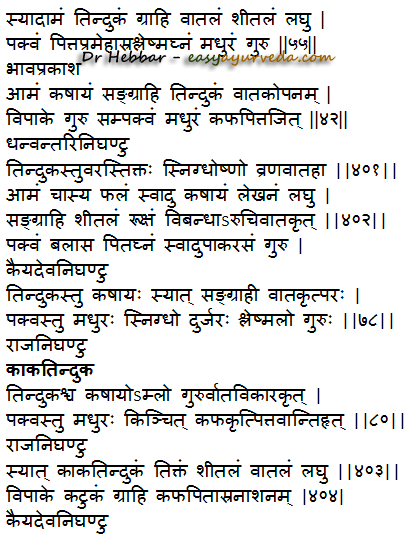Tinduka – Diospyros tomentosa – Uses, Dose, Research
Tendu – Diospyros tomentosa / peregrina fruit, stem bark, seed and seed oil are used in treating urinary tract disorders, abscess, non healing wounds etc, in Ayurveda.
Botanical name- Diospyros tomentosa Roxb, Diospyros peregrina, Diospyros malabarica
Family- Ebenaceae
Table of Contents
Vernacular names
Names in different languages:
Hindi name- Gabha, Tendu, Gaba
English name- Indian or Gaub persimmon
Telugu name- Tumiki
Tamil name- Panichika
Bengali name- Gava
Sanskrit synonyms
Sphurjaka, Sphurjana, KalasKandha, Asita, Virala, Asitakaraka, Neelasara, Atimuktaka, Syandana, Kalasara, Tanuka, Deerghanakha, Spandana, Ravana, Vara,
Chemical composition
Diospyros tomentosa chemical composition:
Lupeol, Betulin, B-sitosterol etc.
Classical categorisation
Charaka- Udardaprasamana – Group of herbs useful against erysipelas, skin rashes
Sushruta- Nyagodhadi gana, Salasaradi gana
Vagbhata – Nyagrodhadi gana
Kaiyadeva Nighantu – Oshadhi Varga
Rajanighantu, Dhanvantari Nighantu, Bhavaprakasha – Amradi Varga
Medicinal properties
Diospyros tomentosa – Tinduka medicinal properties
Guna (qualities) – Laghu (lightness), Rooksha (dryness)
Rasa (taste) – Kashaya (astringent)
Vipaka- Katu – Undergoes pungent taste conversion after digestion
Veerya(potency) – Sheeta – Coolant
Effect on Tridosha – Increases Vata Dosha
Part used, dosage
Part used- Stem bark, fruit, seed, seed oil
Dosage-
Decoction 50-100 ml
seed powder 1-3 g
seed oil 10-20 drops
Sanskrit verse

Uses
Diospyros tomentosa Uses:
Stem bark and seed:
Tuvara – astringent
Tikta – bitter
Snigdha – unctuous
Ushna – hot
Vranaha – heals wounds quickly
Vataha – useful in Vata imbalance disorders
Unripe fruit:
Grahi – absorbent, bowel binding, useful in IBS, diarrhea
Vatala – Increases Vata Dosha
Rooksha – dry
Sheetala – coolant
Laghu – light to digest
Lekhana – scraping
Vibandhakrut – causes constipation
Aruchikrut – May cause anorexia
Ripe fruit:
Madhura – sweet
Guru – heavy (difficult to digest)
Balances Pitta and Kapha
Indicated in:
Prameha – Urinary tract disorders, diabetes
Asra –blood vitiation disorders such as abscess, bleeding disorders, vascular disorders etc
External application
Its stem bark is applied externally to treat abscesses and boils, due to astringent properties.
Interaction with medicines, supplements
Can this be used while taking Homeopathic medicine?
Yes. This product does not react with homeopathic medicine.
Can this medicine be continued while taking supplements like multivitamin tablets, Omega 3 fatty acids etc.?
Yes. Generally, this product goes well with most dietary supplements. However, if you are taking more than one product per day, please consult your doctor for an opinion.
With western medicines
Seek your doctor’s advice if you are taking this product along with other western (allopathic / modern) medicines. Some Ayurvedic herbs can interact with modern medicine.
If both Ayurvedic and allopathic medicines are advised together, then it is best to take Allopathic medicine first, wait for 30 minutes and then take the Ayurvedic medicine.
Ayurvedic medicines
Ayurvedic medicines with Tinduka as ingredient:
Nyagrodhadi Kashayam – Improves skin complexion and quality, helps to relieve diarrhoea, speeds up the healing process of bone fracture
Research
Anti-tumor and anti oxidant properties of Diospyros peregrina of methanol extract on albino mice.
Antidiabetic activity of Diospyros peregrina fruit
Persimmon ( Diospyros kaki ) and its variants
Persimmons, japanese, raw
Similar to Tinduka, Indian persimmons
Rasa – sweet, slightly sour
Guna – light (used in weight loss treatment)
Veerya – hot (aids digestion)
Vipaka – Sweet
Effect on Doshas
Vata balancing (used in constipation
Pitta balancing (used to reduce body temperature)
Kapha balancing (used in fluid retention)
Persimmons, japanese, dried
Rasa – sweet, slightly sour
Guna – heavy (drying increases concentration of nutrients)
Veerya – hot
Vipaka – Sweet
Effect on Doshas
Vata balancing
Pitta balancing
Kapha increasing (since it contains more concentration of nutrients, it leads to Kapha increase)
Persimmons, native, raw
Similar to Tinduka, Indian persimmons
Rasa – sweet, slightly sour
Guna – light (used in weight loss treatment)
Veerya – hot (aids digestion)
Vipaka – Sweet
Effect on Doshas
Vata balancing (used in constipation)
Pitta balancing (used to reduce body temperature)
Kapha balancing (used in fluid retention)
Sthanika Karma (Systemic Action)
External – It has Anti inflammatory, Styptic actions.
Digestive system – Absorbent
Circulatory System – Indicated in bleeding disorders. Act as a blood purifier.
Respiratory system – Pacifies kapha dosha
Excretory system – decreases urine output
Satmikarana – Anti poisonous
Skin – Indicated in Skin disorders and in allergic skin lesions.
Tapakrama – beneficial in Fever (Jirna jvara)









2 comments on “Tinduka – Diospyros tomentosa – Uses, Dose, Research”
Siddharth
Who manufactures the oil, decoction etc as mentioned in the blog? Where can we procure these?
Dr J V Hebbar MD(Ayu)
Hi, the oil, decoction etc are not available in the market.